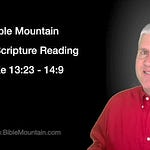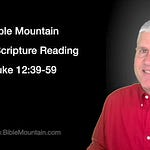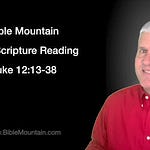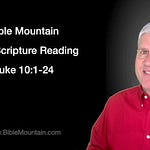Transcript:
Many people outside Christianity acknowledge that Jesus was a great teacher. They also acknowledge that Jesus was a moral man with great moral teachings.
Inside Christianity, some people perceive the teachings of Jesus as only having moral implications. They think the gospels only contain instructions on how to live. They are unaware of the wisdom for dealing with obstacles and opponents that can be gleaned by studying the life of Jesus.
As we go through life, people will oppose us for various reasons. They will use multiple techniques and arguments to prevent us from achieving our goals. This leads to confrontation. In addition to instructions on how to live a moral life, Jesus also demonstrated how to wisely deal with people who oppose us.
The day after His triumphal entry into Jerusalem, Jesus was leaving Bethany and was hungry. He saw a fig tree and walked over to it to get something to eat. There were no figs on it, so He cursed it. Then He walked into Jerusalem, into the temple, and threw the merchants and money changers out of the temple because they had turned God’s house of prayer into a robber’s den.
Mark 11:19 ¶ And when evening came, they were going out of the city.
Mark 11:20 ¶ And as they were passing by in the morning, they saw the fig tree withered from the roots.
Jesus’ curse was that no one would ever eat from the tree again. The result was it withered and died.
Mark 11:21 And being reminded, Peter said to Him, “Rabbi, look, the fig tree which You cursed has withered.”
Mark 11:22 And Jesus answered and said to them, “Have faith in God.
Mark 11:23 Truly I say to you, whoever says to this mountain, ‘Be taken up and cast into the sea,’ and does not doubt in his heart, but believes that what he says is going to happen, it will be granted him.
Jesus once again emphasized the importance of faith. Faith is belief. According to Hebrews 11:1, Faith is “the conviction of things not seen.” When Jesus cursed the fig tree and prohibited anyone from ever eating from it again, He had complete confidence it would happen, and it did happen, even though the cycle of nature indicated it was a healthy tree and people would eat from it again.
Mark 11:24 For this reason I say to you, all things for which you pray and ask, believe that you have received them, and they will be granted to you.
Jesus told Peter and the disciples that in order for prayer to work, they had to believe that their request would happen. They had to believe that God can do what they were asking Him to do.
Mark 11:25 And whenever you stand praying, forgive, if you have anything against anyone, so that your Father who is in heaven will also forgive you your transgressions.
Forgiveness is an important prerequisite to forgiveness. Anyone who refuses to forgive should not expect forgiveness from God.
Mark 11:26 [But if you do not forgive, neither will your Father who is in heaven forgive your transgressions.”]
Mark 11:27 ¶ Then they came again to Jerusalem. And as He was walking in the temple, the chief priests and the scribes and the elders came to Him,
Mark 11:28 and began saying to Him, “By what authority are You doing these things, or who gave You this authority to do these things?”
Notice who was challenging Jesus. It was the priests, scribes, and elders. They were the leaders. They were the ones who looked the other way, or perhaps approved, when the merchants and money changers turned the temple into a robber’s den. They saw Jesus as a threat.
They asked Jesus who gave Him the authority to do what He was doing. They did not specifically mention cleansing the temple, although I’m sure that had to be on their mind. They wanted to know who gave Jesus the authority to do His entire ministry.
Mark 11:29 And Jesus said to them, “I will ask you one question, and you answer Me, and then I will tell you by what authority I do these things.
Jesus could not ignore the question, but He did not want to answer it either. Jesus knew the leaders were not interested in His answer. He knew the leaders were asking because they believed Jesus did not have the authority to do what He was doing. The leaders thought by asking their question, they could demonstrate to the people that Jesus was acting inappropriately and out of line.
Instead of answering their question or refusing to answer their question, Jesus posed His own question.
Mark 11:30 Was the baptism of John from heaven, or from men? Answer Me.”
Mark 11:31 And they began reasoning among themselves, saying, “If we say, ‘From heaven,’ He will say, ‘Then why did you not believe him?’
Mark 11:32 But if we say, ‘From men’?”—they were afraid of the crowd, for everyone was regarding John to have been a real prophet.
Jesus was very wise. He put the Jewish leaders into a bind. The leaders knew they would be stuck no matter which answer they gave.
Mark 11:33 And answering Jesus, they said, “We do not know.” And Jesus said to them, “Neither will I tell you by what authority I do these things.”
The Jewish leaders refused to answer Jesus’ question, which opened the door for Jesus to ignore their question.
Many people both inside and outside of Christianity think of Jesus as a great moral teacher. However, they often miss the fact that Jesus was a very wise man. He was very skilled in how He dealt with those who were opposed to Him.
The Jewish leaders asked Jesus a question that was designed to put Jesus in a bind. Jesus was wise enough to perceive the bind, and got our of the situation with His own brilliant question. When we study the life of Jesus, we not only learn right from wrong, we can also learn how to live wisely and astutely.
Mark 12:1 ¶ And He began to speak to them in parables: “A man PLANTED A VINEYARD AND PUT A WALL AROUND IT, AND DUG A VAT UNDER THE WINE PRESS AND BUILT A TOWER, and rented it out to vine-growers and went on a journey.
This is a picture of God creating the nation of Israel and appointing leaders to shepherd the nation.
Mark 12:2 And at the harvest time he sent a slave to the vine-growers, in order to receive some of the fruit of the vineyard from the vine-growers.
Mark 12:3 And they took him, and beat him and sent him away empty-handed.
Mark 12:4 And again he sent them another slave, and they wounded him in the head, and treated him shamefully.
Mark 12:5 And he sent another, and that one they killed; and so with many others, beating some and killing others.
The slaves who were killed is a reference to the Old Testament prophets who were killed by the corrupt leaders of Israel.
Mark 12:6 He had one more, a beloved son; he sent him last of all to them, saying, ‘They will respect my son.’
This refers to Jesus coming to earth as a man in the 1st century AD.
Mark 12:7 But those vine-growers said to one another, ‘This is the heir; come, let us kill him, and the inheritance will be ours!’
Mark 12:8 And they took him, and killed him and threw him out of the vineyard.
Just as the vine-growers killed the son, so too the 1st century Jewish leaders killed Jesus.
Mark 12:9 What will the owner of the vineyard do? He will come and destroy the vine-growers, and will give the vineyard to others.
For the last two thousand years, God has been working through Gentiles, not through the Jews.
Mark 12:10 Have you not even read this Scripture:
‘THE STONE WHICH THE BUILDERS REJECTED,
THIS HAS BECOME THE CHIEF CORNER stone;
Mark 12:11 THIS CAME ABOUT FROM THE LORD,
AND IT IS MARVELOUS IN OUR EYES’?”
Mark 12:12 ¶ And they were seeking to seize Him, and yet they feared the crowd, for they understood that He spoke the parable against them. And so they left Him and went away.
The Jewish leaders were correct that the parable was directed against them. This gave them more reason to want to kill Jesus.
Many people think Jesus was only a moral teacher. However, He was a very wise man who demonstrated how to deal with obstacles, particularly people who oppose good things.
The Jewish leaders asked Jesus a question that was designed to put Jesus in a bind. Jesus was wise enough to perceive the bind, and got our of the situation with His own brilliant question. When we study the life of Jesus, we not only learn right from wrong, we can also learn how to live wisely and astutely.
Thanks for visiting Bible Mountain. If you have already joined my email list, thank you and please tell others about Bible Mountain. If you have not joined my email list yet, please do so now. In order to join, go to Bible Mountain dotcom, click on subscribe, and that will take you to a page where you can sign up. Your email address will not be sold nor given away. Once again, thanks for visiting Bible Mountain.
“Scripture quotations taken from the (LSB®) Legacy Standard Bible®, Copyright © 2021 by The Lockman Foundation. Used by permission. All rights reserved. Managed in partnership with Three Sixteen Publishing Inc. LSBible.org and 316publishing.com.”








